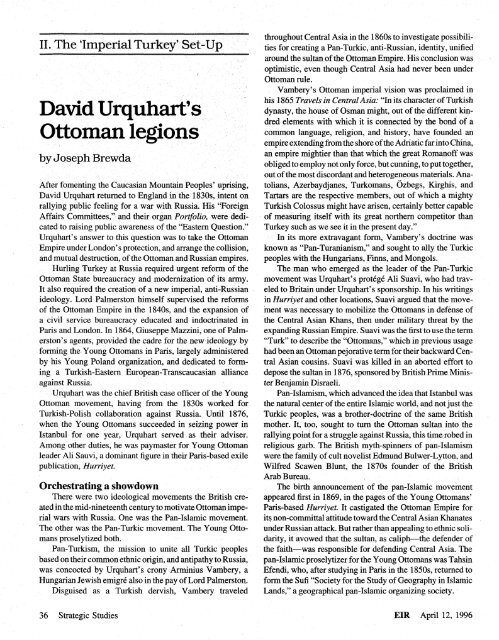Full Issue (PDF) - Executive Intelligence Review
Full Issue (PDF) - Executive Intelligence Review
Full Issue (PDF) - Executive Intelligence Review
You also want an ePaper? Increase the reach of your titles
YUMPU automatically turns print PDFs into web optimized ePapers that Google loves.
II. The 'Imperial Turkey' Set-Up<br />
David Urquharfs<br />
Ottoman legions<br />
by Joseph Brewda<br />
After fomenting the Caucasian Mountain Peoples' upnsing,<br />
David Urquhart returned to England in the 1830s, intent on<br />
rallying public feeling for a war with Russia. His "Foreign<br />
Affairs Committees," and their organ Portfolio, were dedicated<br />
to raising public awareness of the "Eastern Question."<br />
Urquhart's answer to this question was to take the Ottoman<br />
Empire under London's protection, and arrange the collision,<br />
and mutual destruction, of the Ottoman and Russian empires.<br />
Hurling Turkey at Russia required urgent reform of the<br />
Ottoman State bureaucracy and modernization of its army.<br />
It also required the creation of a new impenal, anti-Russian<br />
ideology. Lord Palmerston himself supervised the reforms<br />
of the Ottoman Empire in the 1840s, and the expansion of<br />
a civil service bureaucracy educated and indoctrinated in<br />
Paris and London. In 1864, Giuseppe Mazzini, one of Palmerston's<br />
agents, provided the cadre for the new ideology by<br />
forming the Young Ottomans in Paris, largely administered<br />
by his Young Poland organization, and dedicated to forming<br />
a Turkish-Eastern European-Transcaucasian alliance<br />
against Russia.<br />
Urquhart was the chief British case officer of the Young<br />
Ottoman movement, having from the 1830s worked for<br />
Turkish-Polish collaboration against Russia. Until 1876,<br />
when the Young Ottomans succeeded in seizing power in<br />
Istanbul for one year, Urquhart served as their adviser.<br />
Among other duties, he was paymaster for Young Ottoman<br />
leader Ali Sauvi, a dominant figure in their Paris-based exile<br />
publication, Hurriyet.<br />
Orchestrating a showdown<br />
There were two ideological movements the British created<br />
in the mid-nineteenth century to motivate Ottoman imperial<br />
wars with Russia. One was the Pan-Islamic movement.<br />
The other was the Pan-Turkic movement. The Young Ottomans<br />
proselytized both.<br />
Pan-Turkism, the mission to unite all Turkic peoples<br />
based on their common ethnic origin, and antipathy to Russia,<br />
was concocted by Urquhart's crony Arminius Vambery, a<br />
Hungarian Jewish emigre also in the pay of Lord Palmerston.<br />
Disguised as a Turkish dervish, Vambery traveled<br />
throughout Central Asia in the 1860s to investigate possibilities<br />
for creating a Pan-Turkic, anti-Russian, identity, unified<br />
around the sultan of the Ottoman Empire. His conclusion was<br />
optimistic, even though Central Asia had never been under<br />
Ottoman rule.<br />
Vambery's Ottoman imperial vision was proclaimed in<br />
his 1865 Travels in Central Asia: "In its character of Turkish<br />
dynasty, the house of Osman might, out of the different kindred<br />
elements with which it is connected by the bond of a<br />
common language, religion, and history, have founded an<br />
empire extending from the shore of the Adriatic far into China,<br />
an empire mightier than that which the great Romanoff was<br />
obliged to employ not only force, but cunning, to put together,<br />
out of the most discordant and heterogeneous materials. Anatolians,<br />
Azerbaydjanes, Turkomans, Ozbegs, Kirghis, and<br />
Tartars are the respective members, out of which a mighty<br />
Turkish Colossus might have arisen, certainly better capable<br />
of measuring itself with its great northern competitor than<br />
Turkey such as we see it in the present day."<br />
In its more extravagant form, Vambery's doctrine was<br />
known as "Pan-Turanianism," and sought to ally the Turkic<br />
peoples with the Hungarians, Finns, and Mongols.<br />
The man who emerged as the leader of the Pan-Turkic<br />
movement was Urquhart's protégé Ali Suavi, who had traveled<br />
to Britain under Urquhart's sponsorship. In his writings<br />
in Hurriyet and other locations, Suavi argued that the movement<br />
was necessary to mobilize the Ottomans in defense of<br />
the Central Asian Khans, then under military threat by the<br />
expanding Russian Empire. Suavi was the first to use the term<br />
"Turk" to describe the "Ottomans," which in previous usage<br />
had been an Ottoman pejorative term for their backward Central<br />
Asian cousins. Suavi was killed in an aborted effort to<br />
depose the sultan in 1876, sponsored by British Prime Minister<br />
Benjamin Disraeli.<br />
Pan-Islanaism, which advanced the idea that Istanbul was<br />
the natural center of the entire Islamic world, and not just the<br />
Turkic peoples, was a brother-doctrine of the same British<br />
mother. It, too, sought to turn the Ottoman sultan into the<br />
rallying point for a struggle against Russia, this time robed in<br />
religious garb. The British myth-spinners of pan-Islamism<br />
were the family of cult novelist Edmund Bulwer-Lytton, and<br />
Wilfred Scawen Blunt, the 1870s founder of the British<br />
Arab Bureau.<br />
The birth announcement of the pan-Islamic movement<br />
appeared first in 1869, in the pages of the Young Ottomans'<br />
Paris-based Hurriyet. It castigated the Ottoman Empire for<br />
its non-committal attitude toward the Central Asian Khanates<br />
under Russian attack. But rather than appealing to ethnic solidarity,<br />
it avowed that the sultan, as caliph—the defender of<br />
the faith—was responsible for defending Central Asia. The<br />
pan-Islamic proselytizer for the Young Ottomans was Tahsin<br />
Efendi, who, after studying in Paris in the 1850s, returned to<br />
form the Sufi "Society for the Study of Geography in Islamic<br />
Lands," a geographical pan-Islamic organizing society.<br />
36 Strategic Studies EIR April 12, 1996

















